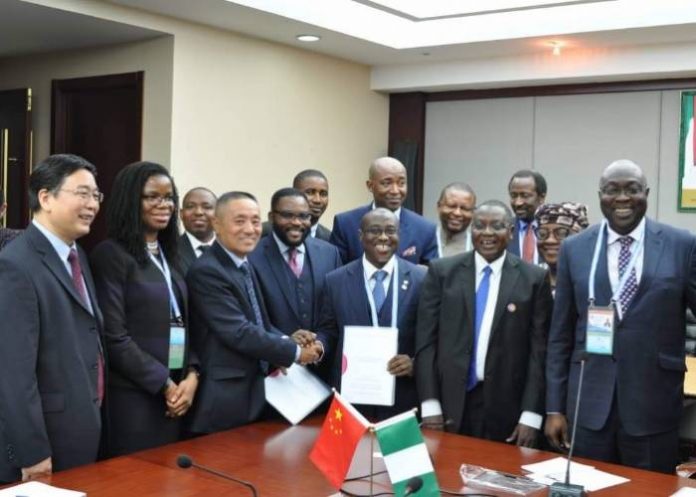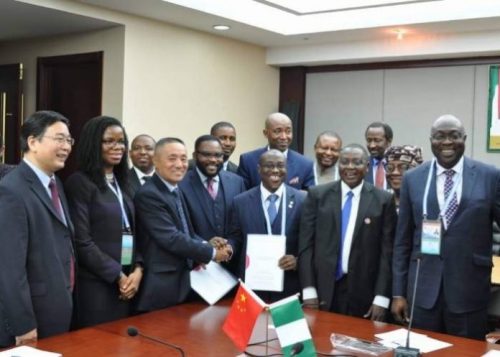
The Nigerian National Petroleum Corporation (NNPC) says it is considering powering all its retail outlets with electricity from solar energy as it planned to venture into solar power generation.
The Corporation disclosed this in a statement signed by its Spokesman, Mr Ndu Ughamadu, in Abuja, on Tuesday.
It said the NNPC also signed a Memorandum of Understanding (MoU) in China with two consortia, towards the development of sustainable biofuels in the country.
The two MoUs on the biofuels project development were signed between NNPC and the Obax-Complant Consortium on one hand and NNPC and the Capegate-Nanning Consortium on the other hand.
Obax And Capegate are two Nigerian companies, Complant And Nanning are two reputable companies incorporated in China
It added that the Group Managing Director of the NNPC Dr Maikanti Baru and executive officers of the consortia signed the agreements at the Nigerian Embassy in Beijing on the sidelines of the ongoing Forum for China-Africa Cooperation (FOCAC) Summit.
Baru said the renewable energy project was dear to the current administration, which was why shortly after assuming office at the NNPC, he made it one of the cardinal programmes of his corporate vision of 12 Business Focus Areas (BUFA).
He said “As part of NNPC’s expanded programme on providing renewable energy solutions, the corporation is planning to power all its retail outlets by means of Solar PhotoVoltaic, PV, facilities.
“The NNPC will develop grid and off-grid solar power as a business, thereby enhancing its contribution to the clean fuels initiative of the Federal Government’’.
He noted that the NNPC was poised to domesticating alternative fuels production towards a thriving commercial biofuels Industry which would not only create jobs and rural wealth for the populace but would also complement international efforts towards curbing global warming.
Baru said the MoUs also aimed at implementing the Federal Government’s mandate on clean, alternative and renewable energy programmes, particularly automotive biofuels production nationwide.
According to him, the execution of the two MoUs will help develop the first biofuel production complex in Nigeria.
He added that before the end of the year, the development of not less than three other complexes would commence in the country.
“The aspiration for the exploitation of renewable fuel resources in Nigeria is to implement our nationally determined contributions to the Paris Agreement, part of which requires the blending of 10 per cent by volume of fuel-ethanol in gasoline and 20 per cent by volume of biodiesel in automotive gas oil (diesel) for use in the transportation sector.” he added.
He added that for a country like Nigeria with a daily consumption of over 65 million litres of automotive fuels, it was easy to see that enormous volumes of fuel-ethanol and biodiesel would be needed to meet this obligation.
Baru further said that meeting and sustaining the target required strategic investment in more than 10 large biofuels complexes across the country.
He assured the two consortia that Nigeria’s investment climate was transparent and conducive to willing Investors and charged them to commence the implementation of the biofuels projects without any further delay as preliminary studies on the programme show clear financial indices that are very encouraging for business growth.
The NNPC biofuels programme, he said, centres around sugarcane-fuel ethanol production; cassava-fuel ethanol production as well as oil palm-based biodiesel production.
Speaking on behalf of the Obax-Complant Consortium, President of Complant, Mr. Gu Haitao, said the MOU would culminate into helping NNPC achieve Nigeria’s renewable energy aspirations.
Also responding on behalf of the Capegate-Nanning Consortium, Chairman of the Nanning Board, Mr. Qin Chun Lin, said they looked forward to a great partnership with the NNPC on biofuels production.
Earlier in his remarks, the Deputy Chief of Mission at the Nigerian Embassy in China who supervised the MoUs signing, Ambassador Aliyu Bakori, said with over 185 million people, Nigeria remains a huge market for potential investors.
On her part, the Executive Secretary of the Nigerian Investment Promotion Commission (NIPC), Mrs. Yewande Sadiku, said the Commission’s doors would always be opened to investors in need of relevant information towards investment in the country.



Comment here